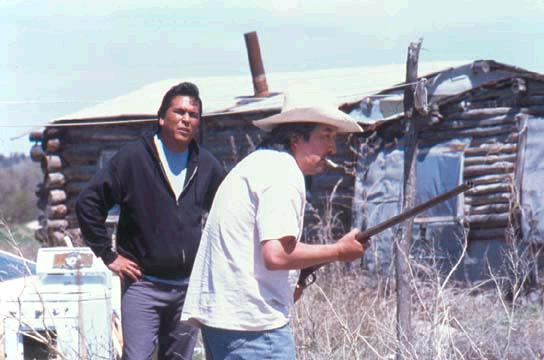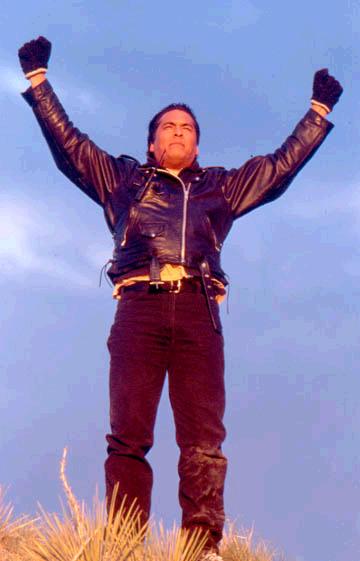

Chris Eyre came to prominence in 1988 for directing Smoke Signals, the light Native American road trip movie. It was the first movie written and directed by Native Americans, and set a high bar. In the meantime, the writer of Smoke Signals came out with The Business of Fancydancing, and now Eyre (Things We Do) is back with Skins. Both are notable in that their tone is extremely different than that of their first movie. Anger and resentment figure prominently in both these new films. Skins takes place on the Pine Ridge Indian Reservation in South Dakota, near Mt. Rushmore. It is primarily about the relationship between two grown brothers, close in childhood but living completely different lives now.
Rudy Yellow Lodge (Eric Schweig, Big Eden, Tom and Huck) is the younger brother and the more successful of the two. He has managed to overcome all of the hardships that Native Americans suffer through, and works as a policeman. His older brother Mogie (Graham Greene, Snow Dogs, Lost and Delirious) is a serious alcoholic, who spends his entire day getting drunk. Despite all of Rudy's efforts, Mogie looks like he will never change. An even worse strain on their relationship is that Rudy often picks Mogie up and throws him in jail for being drunk. Rudy is frustrated because he used to look up to Mogie, and now finds their roles reversed. His frustration also extends to the plight of Native Americans, and it comes out as a sort of vigilante alter ego.
Sadly, Skins is laboriously slow. It starts well with a devastating documentary, and ends with a striking protest image, but much of what lies in between takes its own sweet time. There is a lot of background and history that is nice to know to understand a lot of what is going on in Skins, but not much to the story itself. Jennifer D. Lyne adapted the story from the novel by Adrian C. Louis, and it feels at times like she adapted the novel without taking the time to transplant it to the screen. Aside from the lack of story, Schweig and Greene give impressive performances. Greene is always enjoyable in whatever he does, and here manages to make his character look sad instead of turning him into comic relief. Schweig was great in the little seen Big Eden, and here displays a sense of rage underneath a calm outward appearance. It is a good thing that one can watch Greene and Schweig while sitting through an otherwise dull film.